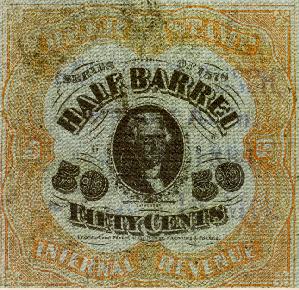A Quick History of the IRTP Statement.
by Charlie B. and Mark B.
The words “Internal Revenue Tax Paid” or one of the variations of that statement, are often enough to send a dumper’s heart racing. Since it was required on cans filled before March 1950, seeing "IRTP" means the dump has some age to it. But what, exactly, did those words mean and why were they required. Charlie B. explained on the Rusty Bunch discussion board not to long ago….
Federal Excise tax on beer goes back to the Civil War and has been continuously collected since then. In 1950 the Federal excise tax was $8.00 dollars per 31-gallon barrel. In 2004 the tax is $18 for our 3 large brewers and imports, and $9 per barrel for the first 60,000 barrels for qualified small brewers.
 |
Brewery Barrel Tax Stamp, circa 1870s. |
The IRTP Statement could take one of several forms.
- Tax Paid at the Rate Prescribed by Internal Revenue Law
- Tax Paid at the Rate Prescribed by Internal Revenue
- Internal Revenue Tax Paid
If the can (or bottle) was destined for export or was sold to the US government (generally as military supplies) then it was not subject to the tax and the label would read "Withdrawn Free of Internal Revenue Tax for Exportation." This might also be stamped on the lid of a can.
In 1950 all this changed significantly. Stamps went away as a form of tax payment and brewers went to a tax return system for paying Federal excise tax. The tax was determined when the beer was removed from the brewery on its way to market, and not before it was removed. This applied whether the beer was in kegs, cans or bottles. Since the tax was paid after the beer was removed from the brewery and was generally paid every two weeks by the brewers, this meant that at times there would be beer in the marketplace that had been removed from the brewery but on which the tax was not yet paid. Thus, the IRS decided the term “Internal Revenue Tax Paid” was no longer appropriate since there might be some non-tax-paid beer in the market. So the IRS changed everything starting in March 1950. Prior to March 1950, all beer was required to bear the “IRTP” description. After March 1950, it was prohibited (and still is) to indicate payment or nonpayment of internal revenue taxes on packages of beer. This eliminated both the “IRTP” statement as well as the “Withdrawn Free” statements on all labels.
The Treasury decision implementing this policy was published in the autumn of 1949. It allowed brewers to remove the IRTP statement from beer packaging immediately, or as early as October or November 1949, upon application to the District Director of Internal Revenue. Conversely, it also allowed brewers to apply to the District Director to continue to use packaging with the IRTP inscription after March 1950, provided the brewer informed IRS of the amount of packaging on hand and the time necessary to use it up. In individual cases this may have been quite a while.
Some brewers, such as Pabst and Blatz, changed to cans without the IRTP statement from the can body and began using lids with the IRTP statement on them prior to this mandate taking effect. Some brewers took the opportunity to completely change their can design (such as Budweiser) while others simply dropped the tax statement.
